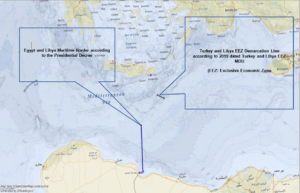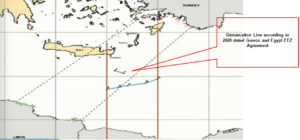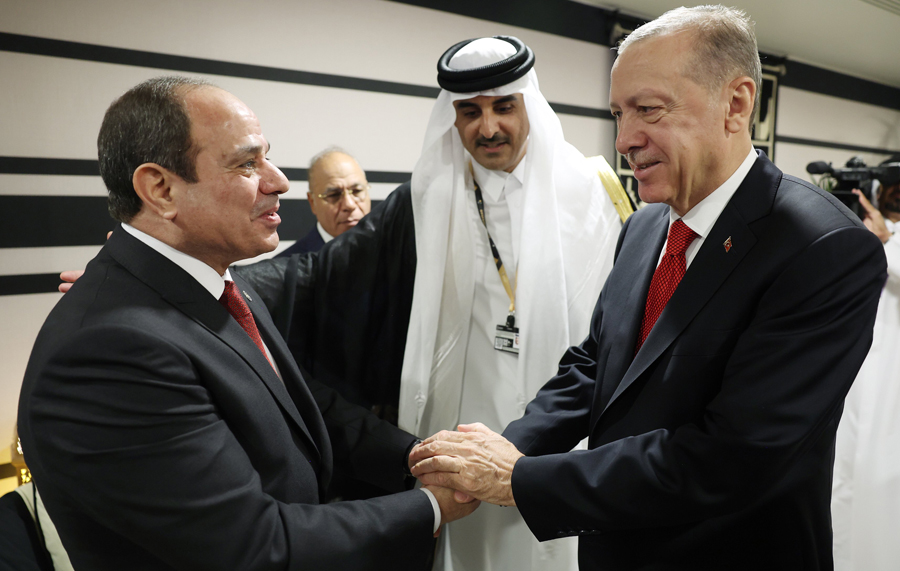Fatih Yurtsever*
Turkish President Recep Tayyip Erdoğan’s warm handshake with Egyptian President Abdel Fattah el-Sisi during the opening ceremony of the FIFA World Cup in Qatar is likely to accelerate the process launched in 2021 to restore diplomatic relations between the two countries, which had been downgraded to the level of chargé d’affaires in 2013. However, el-Sisi issued a decree on Tuesday unilaterally determining the country’s western maritime borders, including the exclusive economic zone (EEZ) between Egypt and Libya. “The borders of Egypt’s territorial waters begin from the Egyptian-Libyan land border point No. 1 for a distance of 12 nautical miles reaching point No. 8, and thus Egypt’s western maritime borderline launches from point No. 8 in the direction of the north,” the presidential decree published in the official gazette states.
The Turkish Foreign Ministry has not yet commented on the decree. Under normal circumstances, Turkey should have reacted sharply since the decree violates the “Blue Homeland” doctrine, which maximally determines Turkey’s maritime jurisdiction areas. So why does Turkey prefer to remain silent on this decree, which makes the agreement on the delimitation of the Turkish-Libyan EEZ controversial under international law?

Turkey and Libya’s Government of National Accord (GNA) signed a Memorandum of Understanding (MOU) on the delimitation of the EEZ in the eastern Mediterranean in 2019. According to the MOU, the parties agreed on the delimitation line of the EEZ, with the area south and southwest of the demarcation line constituting the Libyan EEZ. Greece and Egypt objected to this MOU, describing it as illegal and violating international law. Greece claimed it infringed on its EEZ and especially that off the island of Crete. Therefore, in 2020, Egypt and Greece signed an agreement on the delimitation of the EEZ in the eastern Mediterranean. In Greece, diplomats said the agreement effectively nullified the MOU between Turkey and the GNA. Turkey’s foreign ministry said the EEZ designated in the agreement signed between Egypt and Greece falls in the area of Turkey’s EEZ and that therefore, the agreement was null and void, violating Libya’s maritime rights.

Turkey’s aggressive foreign policy, described as coercive diplomacy, in the eastern Mediterranean under the Blue Homeland doctrine, which defines the boundaries of Turkey’s maritime jurisdiction in the Aegean and eastern Mediterranean with a maximalist approach, has resulted in Turkey’s increasing isolation in the eastern Mediterranean.
Feeling very alone in the region, Turkey abandoned the Blue Homeland doctrine by making a radical policy shift in the eastern Mediterranean when the EU threatened sanctions in December 2020. Turkey suspended its seismic surveys and drilling in disputed areas in the eastern Mediterranean as of March 2021. It has not sent seismic survey vessels west of the 28th meridian east, the eastern boundary of the treaty signed between Egypt and Greece.
Turkey has been making efforts to improve ties with Egypt since 2021 and has launched initiatives to normalize diplomatic relations with Egypt. Relations between Egypt and Turkey became strained in 2013 following the overthrow of the late Egyptian Muslim Brotherhood president, Mohamed Morsi, who was supported by the government of Turkish President Erdoğan.
No progress was made in two rounds of exploratory talks headed by the Egyptian and Turkish deputy foreign ministers in an effort to boost ties, as the two countries support different political groups in Libya.
On Oct. 3, 2022 Turkey and the Libyan Government of National Unity (GNU) signed an agreement on oil and gas exploration in the waters of the Mediterranean Sea that Ankara and Tripoli had claimed as exclusive economic zones in the 2019 Libyan-Turkey MOU. The situation came to a head, and Egyptian Foreign Minister Sameh Shoukry said dialogue between Egypt and Turkey to normalize relations had been suspended because Turkish practices in conflict-ridden Libya remained unchanged. But the unexpected handshake between Erdoğan and Sisi at the opening ceremony of the World Cup in Qatar has restarted the process of normalization.
Looking at the course of relations between Egypt and Turkey, the party that should make concessions is the Erdoğan government. Knowing that Egypt had the upper hand vis-à-vis Turkey, Sisi took advantage of the positive atmosphere created after shaking hands with Erdoğan in Doha and issued a presidential decree defining his country’s maritime border with Libya, interpreted as a complementary action to the Greece-Egypt EEZ agreement. Egypt also aimed with this decree to prevent Turkey from exploring for oil and natural gas with Libya and made the Turkish-Libyan EEZ MOU controversial under international law. In order to avoid jeopardizing the restarted normalization process with Egypt, Turkey showed no reaction to the decree. As a result Sisi said “stop” to Blue Homeland in the eastern Mediterranean.
* Fatih Yurtsever is a former naval officer in the Turkish Armed Forces. He is using a pseudonym out of security concerns.
